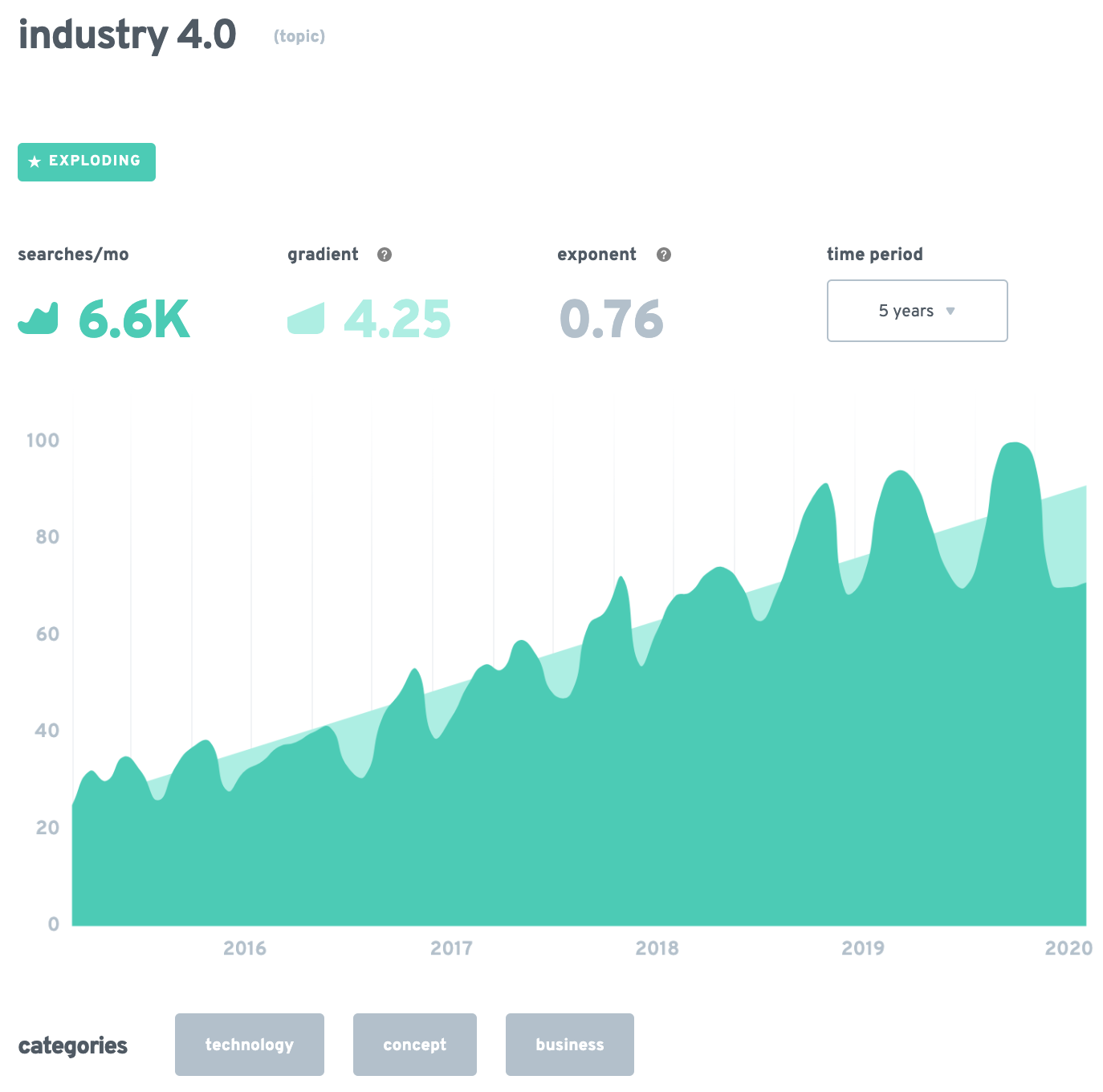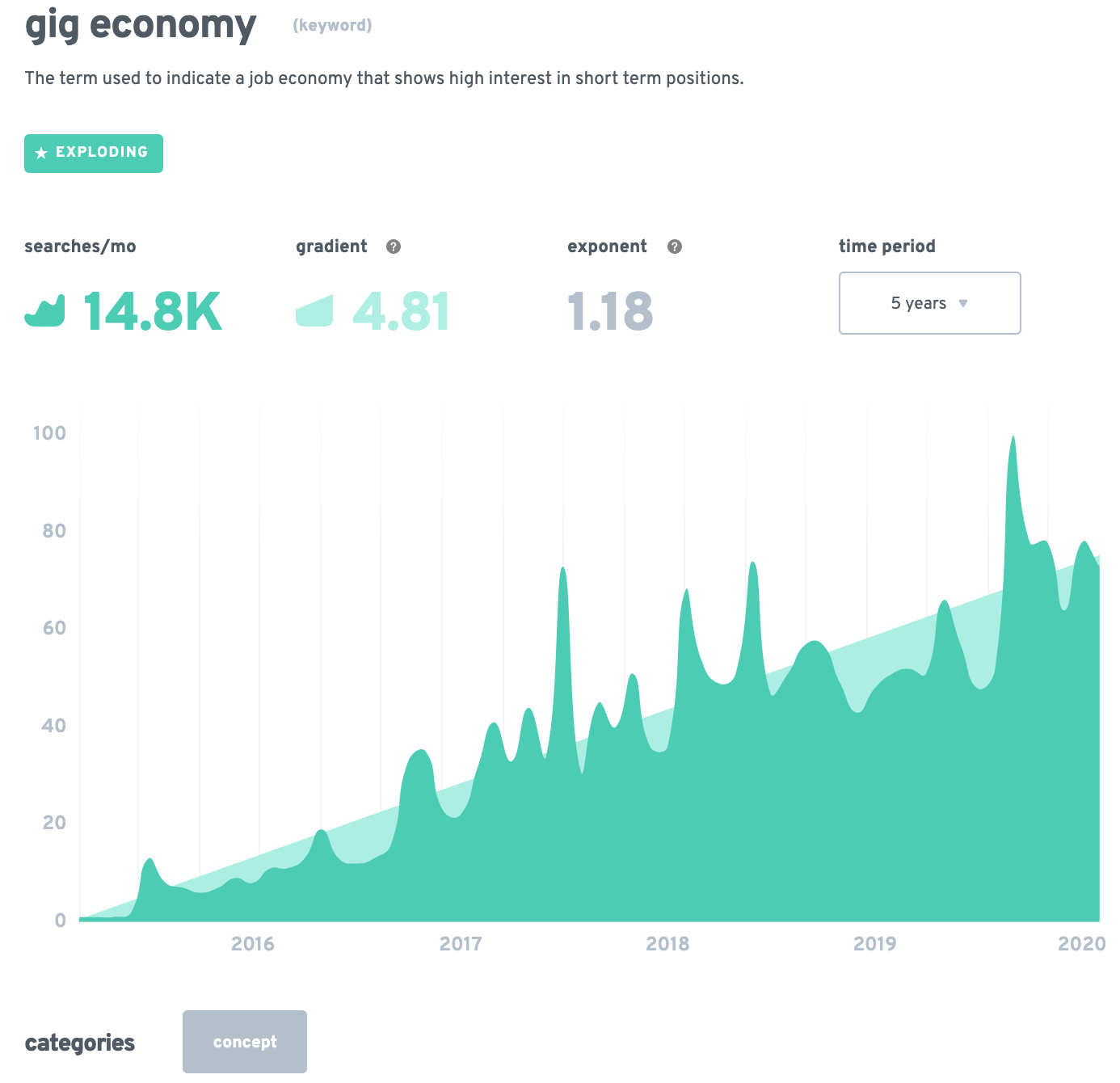Thought Leadership
Industry 4.0 & The Gig Economy
“Industry 4.0” and the “Gig Economy” are explosive topics across governmental and economic sectors, each ascending rapidly in scale, especially over the past five years (see below). They’re, for the most part, discussed as independent issues. What’s, ironically, missing is a connective perspective on how they’re interrelated and ways in which business can better prepare for the changes ahead.
The Gig Economy is comprised of independent workers compensated on a part-time or project basis vs traditional salary; it’s most commonly thought of in the technology-enabled spaces. Industry 4.0 is the fourth wave of industrial revolution driven by optimization of existing computer and automation systems with reinvented data and machine learning software.
The Internet of Things — or the increased connectivity of devices, and people and data through devices — may be the most universally applicable Industry 4.0 impact to business and driver of app-based industry. Given how closely the app industry and gig jobs are paired, they can be considered in tandem as symbiotic topics.
I’m rolling out a 5-part article series that digs into five key things to know (below) about these topics wherein I’ll offer my perspective on implications and considerations for brand leaders.
Gig+App Economy: 5 Key Issues to Know
- Data is few & far between: It’s nearly impossible to accurately personify gig workers, measure quantity of gig work and its impact on the economy. Currently there’s a $19,400 gap between reporting thresholds for 1099-C and 1099-K contractor tax forms providing the data we currently analyze.
- Ride Apps are the #1 driver of Gig Jobs: 90% of the known increase in gig workers consists of rideshare; the remainder is a mix between capital platforms (i.e. AirBNB), care jobs (Care.com), arts/crafts (Etsy).
- Gig Jobs aren’t replacing jobs, but driving more demand: Rather than putting traditional industries’ full-timers out of work, ridesharing, specifically, has actually created more of a demand for driving services.
- Barriers to entry are low … but also high: Many attract to working with apps like Lyft / Uber and Etsy given the barriers to entry are extremely low — you can work when and how you need to, and don’t experience the barrier of potential discrimination through an interview process.
- We need more tech education & resources: There are ~500,000 open positions for computer software engineers, but only ~50,000 forecasted computer software graduates.


This information cited in this series is informed by a panel I had the opportunity to attend on 2/7/20: “Work, Employment, and the ‘App’ Economy,” hosted by Georgetown University’s McCourt School of Public Policy and The Goodfriend Group.
Issue areas panelists covered include:
- Whether the app/gig economy is creating jobs or destroying them
- Impact of the app/gig economy on “traditional” full-time jobs
- Characteristics and distribution of gig jobs and workers
- Measurement and data sources of the shifting
- If / how gig jobs should be regulated
Should you want to view the full event, find the recording linked here.
Panelist Experts:
Panel One: Economic Research
- Dr. Katherine Abraham, University of Maryland. Professor of Economics, Professor of Survey Methodology and Director of the Maryland Center for Economics and Policy. Former Commissioner of the Bureau of Labor Statistics from 1993 through 2001 and Member of the President’s Council of Economic Advisers from 2011 through 2013.
- Dr. Dmitri Koutsas, University of Chicago, Assistant Professor at Harris School of Public Policy focused on measuring and understanding the reasons why households participate in alternative work arrangements like the gig economy.
- Dr. Chandra Childers, Study Director, Inst. for Women’s Policy Research and an expert on social stratification, social and economic inequality by race and sex, especially related to women and girls of color.
Panel Two: Stakeholders
- Sam Loesche, Legislative Representative, International Brotherhood of Teamsters, leads transportation public policy and government relations for the nation’s largest transportation union, focusing on the union’s core surface transportation portfolio.
- Tanya Goldman, Senior Policy Analyst, Attorney, Job Quality, Center for Law and Social Policy (CLASP), focusing on policy solutions that improve job quality for workers, strengthen worker protections, and increase economic security for low-income working families.
- Graham Dufault, Senior Director for Public Policy, ACT/The App Association, which represents more than 5,000 app makers and connected device companies in the mobile economy, and former counsel to the Subcommittee on Consumer Protection and Commerce of the U.S. House of Representatives Committee on Energy and Commerce.
- Deon Gordon, President and CEO, TechBirmingham, a non-profit working to strengthen and promote the technology ecosystem by promoting tech companies in the Birmingham, Alabama region, helping to recruit and retain tech talent and entrepreneurs, and providing opportunities for technical training and education.
Moderators:
- Dr. Harry Holzer is the John LaFarge Jr. SJ Professor of Public Policy at Georgetown University’s McCourt School of Public Policy, a Nonresident Senior Fellow at Brookings, and an Institute Fellow at the American Institute for Research in Washington DC. He served as Chief Economist for the U.S. Department of Labor, was a founding faculty director of the Georgetown Center on Poverty and Inequality, and is an affiliate of the Institute for Research on Poverty at the University of Wisconsin-Madison.
- David Goodfriend is President of The Goodfriend Group, a public policy advocacy firm specializing in technology, telecommunications, and media. He is an adjunct professor at The Georgetown University Law Center and George Washington University School of Law, and served as Deputy Staff Secretary to President Clinton, Media Legal Advisor to an FCC Commissioner, and professional staff member to committees of the U.S. Senate and House.
- Posted In
Thought Leadership